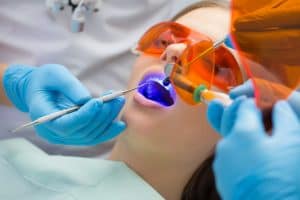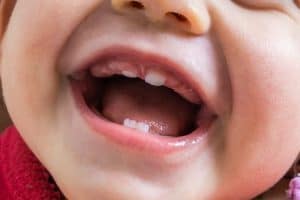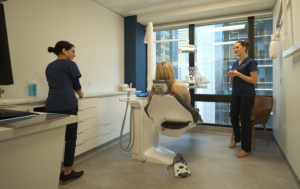To celebrate International Women’s Day, we’re delving into the health and dental issues facing women. In the last blog Women’s Health and Dentistry we discussed the chronic health conditions most faced by women and how they affect the mouth.
This time, we’re talking hormones! Read on to find out how pregnancy and menopause can affect oral health, and vice versa.
Pregnancy
First, things first – it is completely safe to visit your dentist during pregnancy. In fact is actually more important to do so. It’s important not only for mum’s health, but also for the baby. Your dentist knows exactly which medications are safe while you pregnant.

It’s more important than ever to see
your dentist and take care of your
teeth and gums while pregnant.
But what about dental x-rays?
Dental x-rays are taken to see what is going on inside the tooth, between the teeth and under the gum-line where your dentist can’t see. The provide invaluable information about the state of your dental health and the bone supporting the teeth.
The amount of radiation involved is extremely low. In fact, it is the same as the amount of radiation you would get on a 1-2 hour flight. Therefore, even if you’re pregnant you can have x-rays taken, although we try to keep them to a minimum during this time.
Gum Disease and Pregnancy
Hormonal changes during pregnancy can make gums more prone to inflammation, bleeding and swelling – what we call pregnancy gingivitis. Excellent home care of your teeth through twice daily brushing, and daily flossing can help control this. Also seeing your dentist for a professional clean will help. Left un-checked it could develop into gum disease and cause further problems.
Studies have shown links between mother’s having gum disease and affects on the birth and the baby. For example, American Nurse reports a study that showed women who had severe gum disease which was left untreated during pregnancy were more susceptible to early labour.
Gum disease has also been linked to low birth weight and preeclampsia.

Undergoing dental treatment is completely
safe while pregnant.
Diet and Morning Sickness
Morning sickness can be very damaging to teeth. This causes an acidic environment in the mouth , which lowers the pH level in the mouth. This acid causes tooth erosion, which is basically when the tooth starts to dissolve. Acid erosion of the teeth leads to tooth enamel that becomes thin – this causes the teeth to be more sensitive to hot and cold. Thin enamel is more prone to chipping and breaking. In very severe cases, the nerve inside the tooth can be irreversibly damaged.
If you have been sick, don’t brush your teeth afterwards. The acids will have softened the tooth surface and the brushing action could abrade and damage the teeth further. Instead, drink water and rinse with a fluoride mouthwash to help protect the teeth. Other things that help return the acid levels in the mouth to neutral are milk, cheese and yogurt – just look for low sugar options.
The other problem pregnant women face are cravings! Look for healthier options if you get that sugar craving. Increased sugar intake will lead to tooth decay. Try and stick to water and plain milk for drinks and fresh fruit and things like cheese and nuts for tooth friendly snacks.
What about after the baby is born?
Once the baby is born, they will start to share the microbiome of their mother. This includes bacteria from the mouth. Remember that certain bacteria cause tooth decay and gum disease. Therefore, mothers with untreated disease can actually pass these disease-causing bacteria on to their babies.
For all these reasons, it is especially important to visit your dentist during pregnancy to ensure a healthy mouth for the time baby arrives.

Bacteria can travel from mum’s mouth to
baby’s, which can cause tooth decay.
Menopause
Most women undergo menopause between the ages of 47 and 55. If this is you, you might be noticing inflamed gums, burning sensations, altered taste sensations and a dry mouth.
Changes in hormone levels are the culprit. You may notice your gums look shiny, pale to deep red and that they bleed easily. Don’t worry, this can be managed and treated by your dentist.
Those pesky hormones can also cause what we call burning mouth syndrome. This is where you feel your mouth is more sensitive to hot and cold, and things taste a bit strange. You may have a metallic taste. Your mouth may feel like it is burning, like it’s on fire, or it can feel numb and tingly. It can affect inside your mouth like inside the cheeks and tongue, or even your lips. Again your dentist can help with managing this condition.

Menopause can cause problems with a mouth
that feels like it’s burning, tingling or dry.
Something else others may experience is a mouth that feels dry. This is because the amount of saliva produced may be reduced. This can make eating, swallowing and speaking more difficult. The biggest risk for those with dry mouth is an increased risk of tooth decay and gum disease. Saliva in in fact incredibly protective of our teeth. It contains substances that help counteract acids and fight bacteria. It’s very important that you chat to your dentist about your dry mouth. They can recommend products to help not only with the discomfort, but also to protect your mouth from gum disease and tooth decay.
What about after menopause?
After menopause, many women can suffer with osteoporosis. This is when the bones become thin, weak and fragile. This can also affect the jaw bones. In addition, medications prescribed to treat osteoporosis can have an impact on the jaw bone and consequently healing following dental surgery. If you have been diagnosed with osteoporosis, it’s important to see you dentist. They can assess the bone levels surrounding the teeth and help prevent problems down the track
What should I do?
The key message here is to see your dentist regularly. Don’t suffer through menopause or pregnancy. Your dentist is able to give you tailored advice to your situation and help with recommending products that can help.
If you’re suffering any of the symptoms mentioned above, or are thinking about getting pregnant, are pregnant or going through menopause, please arrange a dental appointment for a check-up.

Our friendly team can take care of you throughout
your pregnancy or if you are suffering the effects
of menopause.
Regular teeth cleaning and check-ups help maintain good oral health and prevent major problems from occurring. Our highly trained dentist and dental assistants do a thorough check of your teeth, gums and mouth, picking up on things before they become an issue.
Call us on 0732111155 , book online or read more here.



